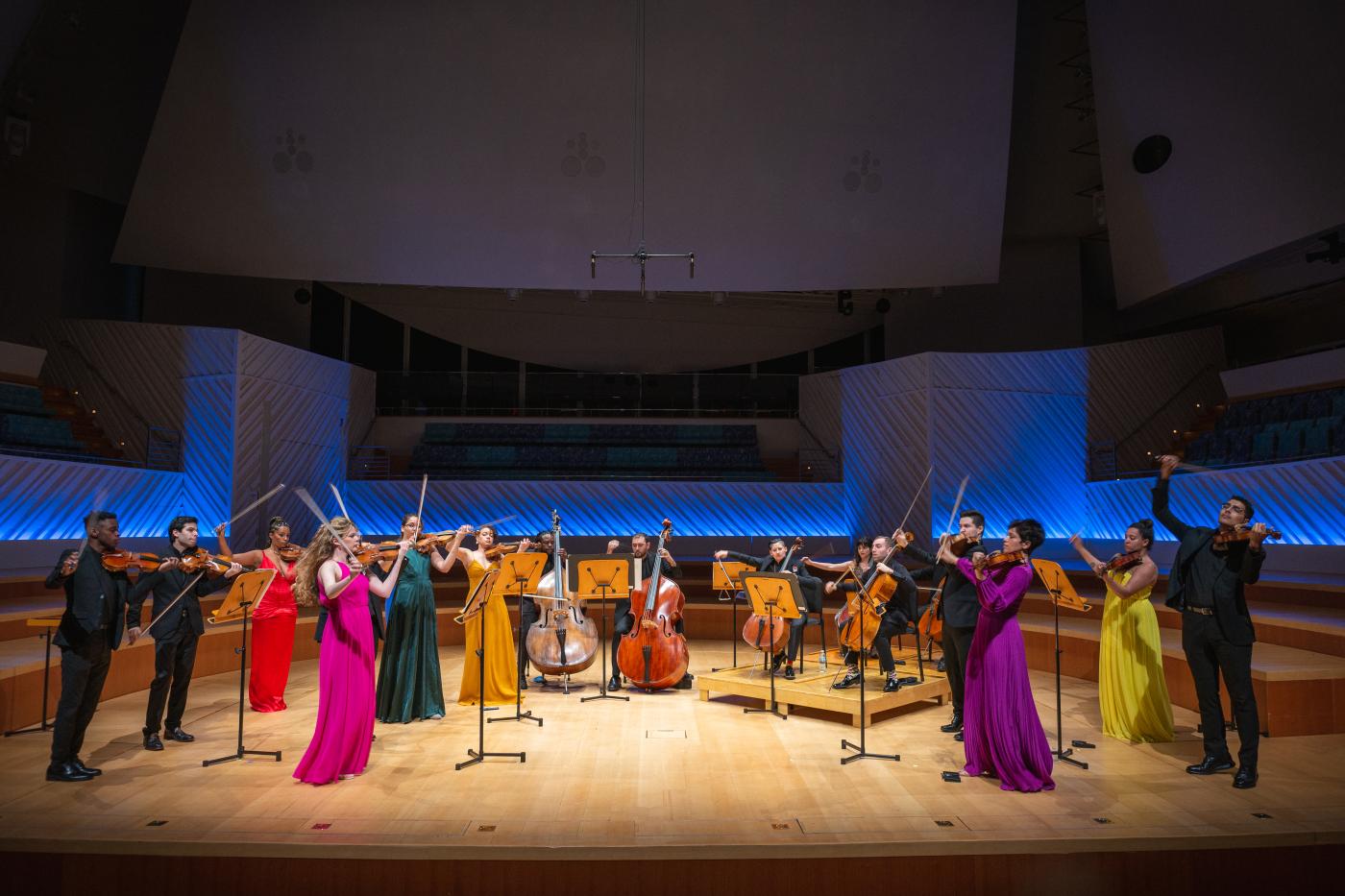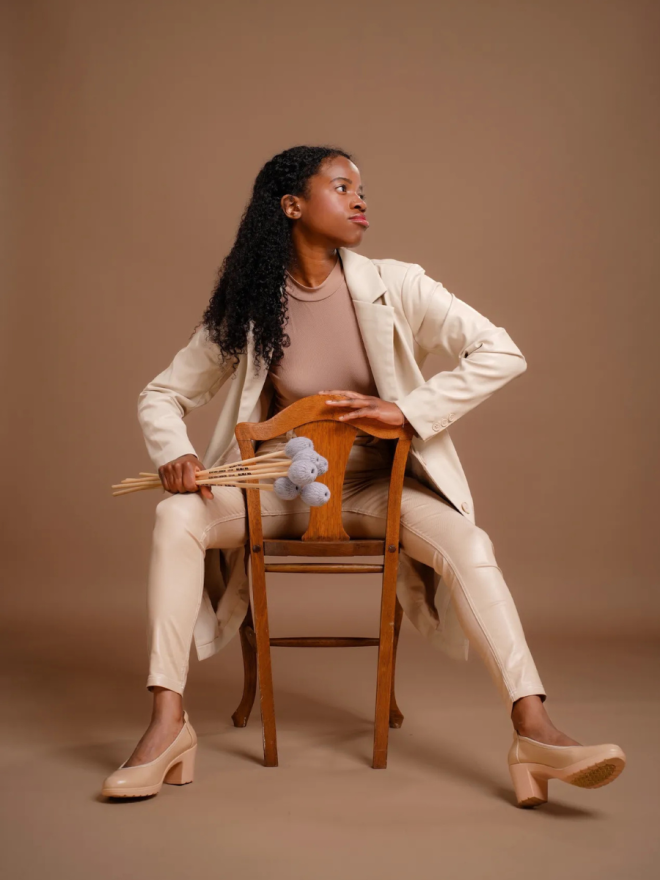Editor's Note: Britton-René has had to step away due to illness, and we are fortunate to have Josh Jones stepping in for the tour.
I was thrilled to hear the Sphinx Virtuosi a year ago (and to blog about it for Classical Score) when they gave an unforgettable performance in Takoma Park as part of the Anna H. Wong Concert Series, so I’m very excited about their October 19th concert at the Kennedy Center, a co-presentation with Washington Performing Arts and The John F. Kennedy Center for the Performing Arts in cooperation with the Coalition for African Americans in the Performing Arts.
The Sphinx Virtuosi, under the auspices of the Sphinx Organization, is a self-conducted chamber orchestra of 18 Black and Latino artists. Their mission is “to evolve the breadth and impact of classical music through artistic excellence, pioneering programming, and impassioned community engagement.” Their debut album, Songs for Our Times, was released in the summer of last year on the Deutsche Grammophon label.
I was glad to connect with percussionist Britton-René Collins, who is performing with the Sphinx Virtuosi on this tour, which will also include New York’s Carnegie Hall and a Philadelphia Chamber Music Society concert.
Evan Keely: This isn’t your first encounter with the Sphinx Virtuosi. It’s abundantly clear that there is a shared and demonstrable passion between you and this ensemble for education and social change, and for lifting up creative contributions, past and present, from communities and individuals whose gifts have not always been sufficiently honored — and even intentionally excluded. What would you want someone attending this Kennedy Center concert to know about your relationship with Sphinx, past and present (and dare I ask about future possibilities)?
Britton-René Collins: I have felt a connection to the Sphinx Organization ever since I was very young, desperately searching for role-models that looked like me in the classical music industry as I struggled to find my voice. Throughout my career I had always wanted to get involved in the incredible work that Sphinx does, and this collaboration has made my dreams come true. Ifeel a sense of pride knowing that my past self, the young girl seeking validation, can now share the stage and creative space with incredible musicians to inspire people of all ages, backgrounds, and identities. I am looking forward to a future in which I will continue a life-long relationship with the very organization which helped me to realize from childhood that there is a space for me, a Black woman, to feel empowered and embraced in the professional classical music community.
EK: This concert is entitled “American Form/s”. Certainly American music is represented in this program, which includes contemporary composers Levi Taylor, Juantio Becenti, Derrick Skye, and Curtis Stewart. What’s your take on this title? How does it inform your approach with this collaboration with the Sphinx Virtuosi?
BC: For me, this program is a marriage of past and present, and a symbol of the future. Being a Black American woman and the daughter of a Jamaican immigrant,I often reflect on Black American History and how my ancestors made it possible for me to exist with a certain amount of privilege in the present. I have been fortunate to travel the world, and in doing so discovered that many cultures, identity groups, and people, have a lot more in common than one might think. This program for me is a musical dialogue on the diverse peoples, stories, and histories which have formed the present-day America. Stories of sorrow, triumph, celebration, and healing.
EK: “American Form/s” includes music by Venezuelan composer Teresa Carreño (1853-1917) and English composer Samuel Coleridge-Taylor (1875-1912); we’ll also hear the overture to the 1911 opera Treemonisha by American composer Scott Joplin (1868-1917), in an arrangement by Jannina Norporth and Jessie Montgomery (both of whom are not only composers, arrangers and educators, but — significantly for this program — violinists). There’s also a lot of new music on this program, including works commissioned by this ensemble. The variety of styles and voices we’ll hear in this concert is broad and complex. For instance, Diné/Navajo composer Juantio Becenti is also noted for having composed music for a 2011 documentary film, Two Spirits, about Fred Martinez, a transgender Navajo teen who lost his life in a hate crime; Levi Taylor is currently composing an opera commissioned by the Washington National Opera through the Kennedy Center’s Social Impact program. What are your insights about this particular concert, its blend of past and present, and its representation of a remarkable variety not only of musical styles, but of perspectives?
BC: What I absolutely appreciate about this particular Sphinx Virtuosi program is its honest representation of historic American themes. I believe that Dialogue centered on American stories which deliberately attempt to erase/evade themes surrounding the injustices which have in the past— and still do in the present— affect indigenous communities, is a disservice to honest storytelling. And, in the context of performing arts, a disservice to historically accurate artistic depiction. As we bring this program to communities, concert halls, and students around the country over the next severalmonths of tour, there is a certain obligation to preserving BIPOC history in our storytelling, as this program servesto both educate and inspire audiences.
EK: Over the years, you’ve kept up a busy teaching and performing schedule, as a soloist with orchestras all over the US and internationally, as well as with your ensembles Excelsis Percussion and your work with Ariel Horowitz in Vision Duo. You’re also a Hodder Fellow this year at Princeton University’s Lewis Center for the Arts. Can you tell us more about the fellowship and other performing, research and teaching work you’re doing, and how this tour with the Sphinx Virtuosi fits in with all that?
BC: My current research and educational pursuits are centered around interacting with historically undervalued communities. As a Hodder Fellow, I will be spending the next year living and working in the Princeton community, generating new commissions for solo percussion by a diverse array of composers— many of whom are friends— as well as composing new works. Being a part of this tour has inspired my creative process as both a composer and a collaborator, as I am particularly focused on creating art with and for my BIPOC community. Through working with my ensembles, Excelsis Percussion and Vision Duo, I have been fortunate to reach and inspire many audiences and students. In particular, working with my duo partner Ariel Horowitz’s organization “The Heartbeat Music Project” has enabled me to participate as a teaching artist in providing free music education to K-12 Diné students residing on the Navajo reservation in Crownpoint, New Mexico. Having the opportunity to work with youth and create accessible environments for music education is what I consider the pinnacle of an artists/educatorsimpact. Having the pleasure of inspiring the next generation of musicians with the Sphinx Virtuosi is a privilege which I do not take for granted.
PBS PASSPORT
Stream tens of thousands of hours of your PBS and local favorites with WETA+ and PBS Passport whenever and wherever you want. Catch up on a single episode or binge-watch full seasons before they air on TV.

